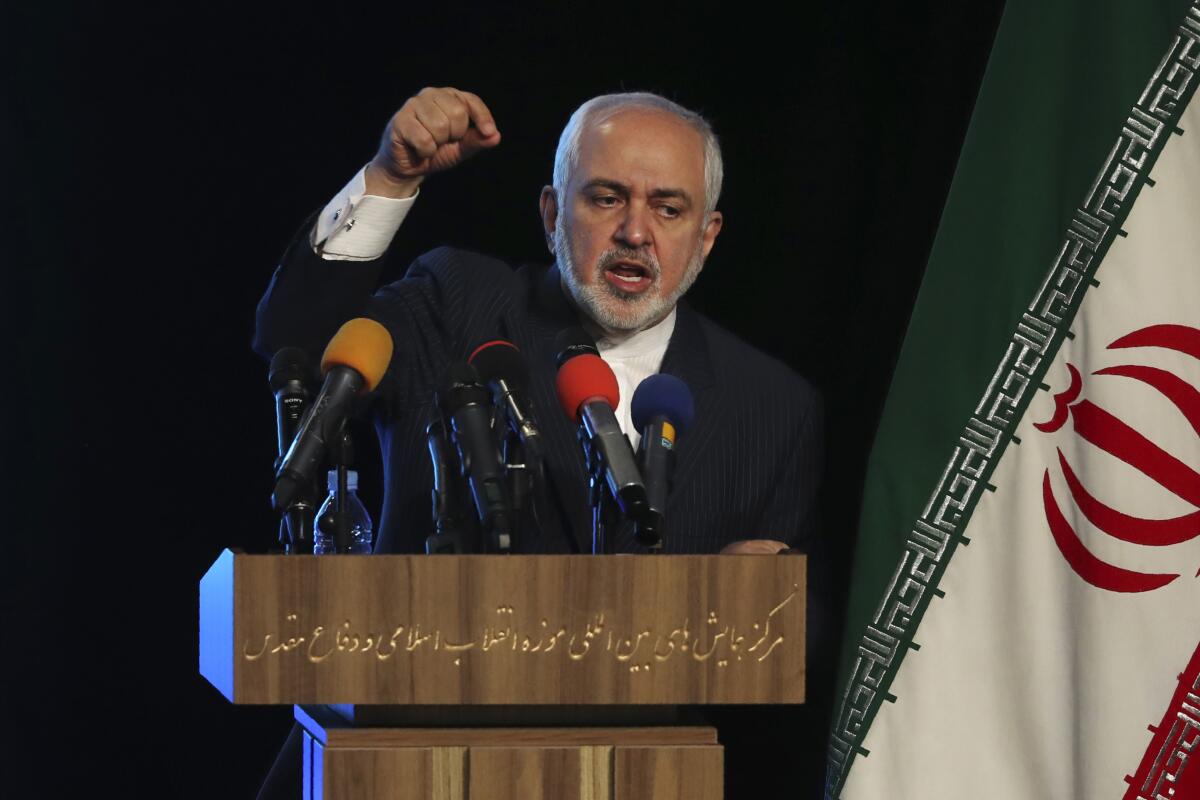Iran officially imposes curbs on UN nuclear inspections

- Share via
TEHRAN, Iran — Iran officially started restricting international inspections of its nuclear facilities Tuesday, a bid to pressure European countries and President Biden’s administration to lift crippling economic sanctions and restore the 2015 nuclear deal.
World powers slammed the restrictions as a “dangerous” move. It came as the International Atomic Energy Agency, or IAEA, reported in a confidential document distributed to member countries, and seen by the Associated Press, that Iran as of Feb. 16 had added to its stockpile 38.8 pounds of uranium enriched up to 20%.
It was the first official confirmation of plans Iran announced in January to enrich to the greater purity, which is just a technical step away from weapons-grade levels and far past the 3.67% purity allowed under the nuclear deal known as the Joint Comprehensive Plan of Action, or JCPOA.
Iran also increased its total enriched uranium stockpile to 6,542.9 pounds, up from the 5,385.7 pounds reported Nov. 2, the IAEA said.
Iran’s violations of the JCPOA and the move Tuesday to limit international inspections underscore the daunting task Biden faces as he seeks to reverse former President Trump’s decision to pull the U.S. out of the deal in 2018. That left Germany, France, Britain, China and Russia struggling to keep the deal alive.
The JCPOA was the most significant pact between Iran and major world powers since the country’s 1979 Islamic revolution. Germany, France and Britain on Tuesday stressed their commitment to preserving the deal, urging Iran to “stop and reverse all measures that reduce transparency.”
“The E3 are united in underlining the dangerous nature of this decision,” the European powers said in a statement. “It will significantly constrain the IAEA’s access to sites and to safeguards-relevant information.”
Iranian Foreign Minister Mohammad Javad Zarif said a law went into effect Tuesday morning under which Iran will no longer share surveillance footage of its nuclear facilities with the U.N. agency.
“We never gave them live video, but [recordings] were given daily and weekly,” Zarif said of the IAEA’s access to information recorded by camera monitors. “The tape recording of our [nuclear] program will be kept in Iran.”
The Atomic Energy Organization of Iran, Tehran’s civilian nuclear agency, has promised to preserve the tapes for three months, then hand them over to the IAEA — but only if granted sanctions relief. Otherwise, Iran has vowed to erase the tapes, narrowing the window for a diplomatic breakthrough.
Since Trump pulled the U.S. out of the JCPOA, Iran has gradually been violating its restrictions to put pressure on the remaining nations to come up with economic incentives to offset crippling American sanctions.
Besides surpassing the purity and stockpiles allowed, Iran has been spinning advanced centrifuges and producing uranium metal.
Zarif stressed in a tweet Tuesday that Iran’s new limits on nuclear inspections and other violations of the pact are reversible, insisting that the U.S. move first to revive the deal.
In a show of defiance, Iranian government spokesman Ali Rabiei on Tuesday outlined further developments in the country’s nuclear program. Over the last three weeks, he told reporters, Iran has installed and started feeding gas into an additional 148 high-tech IR2m centrifuges at its Natanz nuclear enrichment facility and its fortified nuclear complex at Fordo, bringing the total number of centrifuges to 492. Another set of 492 centrifuges will be installed in the coming month, he said.
More to Read
Sign up for Essential California
The most important California stories and recommendations in your inbox every morning.
You may occasionally receive promotional content from the Los Angeles Times.













